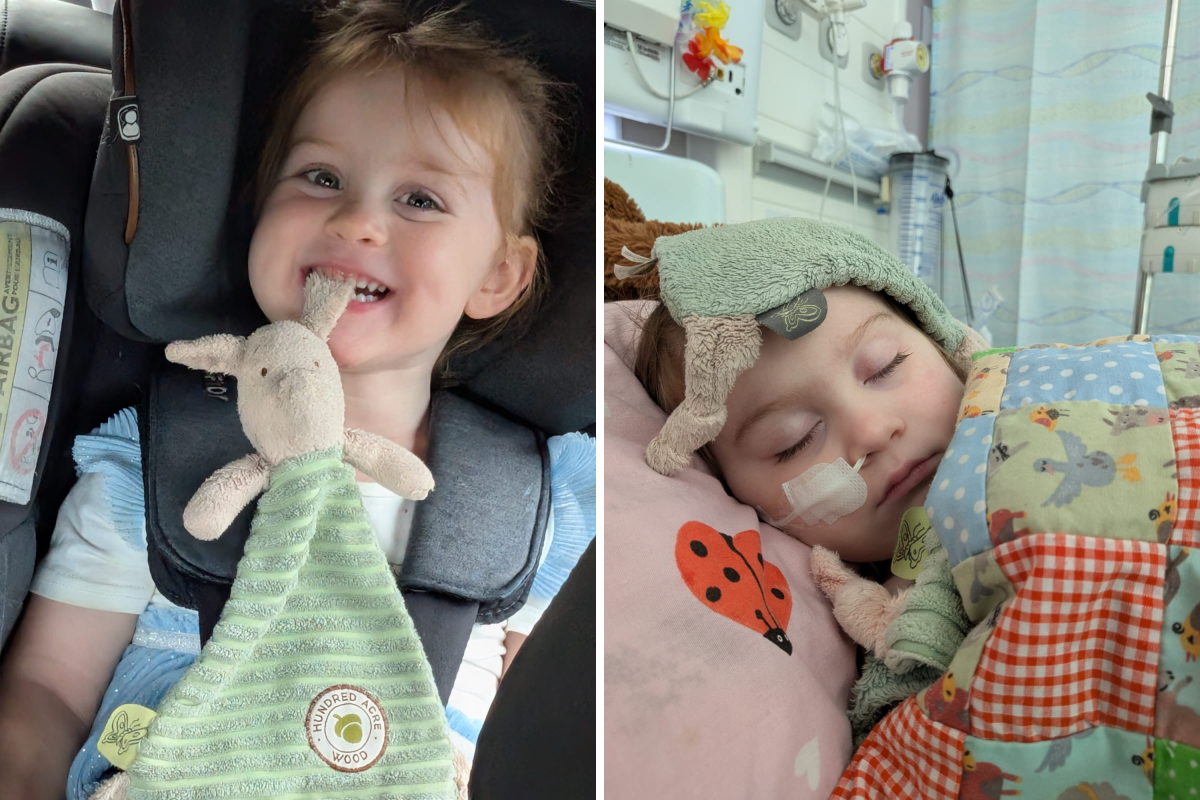When George Gibson, 30, and his wife Laura, 31, took their two-year-old daughter, Harper, for an eye test, they expected a routine visit. The family, residing in Staffordshire, England, anticipated leaving with a simple prescription for glasses to address Harper’s recently developed lazy eye. However, the results of the eye scan sent them into a tailspin.
The optician revealed that Harper’s optic nerve was severely swollen, prompting an immediate referral to the emergency room. “Her optic nerve was extremely swollen, and the optician’s instant response was to stop the eye test and send us straight to the emergency room,” George recalled.
Multiple Missed Diagnoses
Harper had shown signs of unusual fatigue for several weeks, leading her parents to seek medical attention multiple times. Initially, she was diagnosed with an ear infection followed by tonsillitis. Despite her condition worsening, doctors reassured the couple, attributing her lethargy to rest. “They kept saying rest, but that’s all she was doing,” Laura explained. “She couldn’t possibly sleep any more.”
As Harper’s condition deteriorated, including symptoms like confusion and a noticeable head tilt, the couple remained hopeful that it was just a lazy eye requiring glasses. “We didn’t think for one second it would be cancer,” Laura stated.
The urgency of Harper’s condition became clear only after the eye test on August 14, 2023. Within two days, she underwent a nine-hour surgery to remove a tumor from her brain, measuring approximately 1.5 square inches. Surgeons successfully excised 99 to 100 percent of the mass, which was subsequently sent for biopsy.
Eight days later, the family received devastating news: Harper had been diagnosed with medulloblastoma, an aggressive type of brain cancer that originates in the cerebellum. This cancer is the most common malignant brain tumor in children, accounting for nearly 20 percent of pediatric brain tumors in the United States. Each year, about 50 children in the UK receive this diagnosis.
“At that point, your life stops for a moment,” George reflected. “We were left speechless. It was caught at the best time we possibly could.”
Facing the Challenge
On August 30, Harper began her first of six planned rounds of chemotherapy. Her parents expressed admiration for her resilience during this challenging period. “She’s oblivious to the fact that she’s ill—and it’s lovely to see,” Laura noted. After the initial round of treatment, Harper was lively and even managed to make others laugh. However, she also experienced painful side effects, including mouth ulcers and hair loss.
The second round of chemotherapy presented new hurdles. “The aftermath was completely different,” George explained. “Her appetite suppressed—and one night she was in and out of consciousness.”
As the family prepares for the third cycle of treatment, they feel mentally and physically ready to face the challenges ahead. “We’re confident that we’re in safe hands at Birmingham Children’s Hospital,” they stated. “The oncology team has been brilliantly reassuring. We’ve never felt uncertain or unaware of what we’re going through.”
Sharing their journey on social media, the Gibsons hope to provide support to other families navigating similar experiences. George emphasized the importance of open communication, stating, “If you don’t talk about it, you can drive yourself crazy. So many parents feel like they’re alone.”
He continued, “It’s so much better to try to put some positivity into it. Start conversations with a smile.”
Laura concluded, “I always tell people she’s going to change the world with every positive step she takes.”
This family’s story highlights not only the critical nature of early diagnosis but also the strength found in community support and resilience during difficult times.
